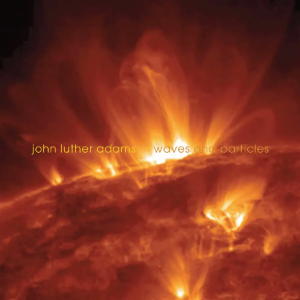
John Luther Adams (b. 1953)
Waves and Particles (2021)
JACK Quartet
rec. 2023, New York
Cold Blue Music CB0069 [50]
Cold Blue Music is a label based in Southern California that specialises in contemporary classical and experimental electro acoustic works. It was founded in the early 1980s by Jim Fox and music with political and environmental concerns have always been a focus. It is therefore no surprise to find that this is their eleventh album featuring music by
John Luther Adams. The composer has said of his work “Music is not what I do. It’s how I understand the world.”
Adams lived for many years in Alaska where he worked as an environmental activist, though he now divides his time between New York City and Mexico. His developing profile as a composer has been slow and continuous. Winning the 2014 Pulitzer Prize for Music with Become Ocean has seen his profile rise exponentially. Even that work though received widely varying reviews from praise to accusations of boredom. His music is certainly not in line with the American avant-garde nor even minimalists, confusion has sometimes arisen with the other more famous John Adams. John Luther Adams is his own man. He discovered the string quartet genre quite late in life writing his first work for this grouping The Wind In High Places in 2011. This present work is his ninth for string quartet.
Waves and Particles consists of six movements, and so the composer tells us” is inspired by quantum physics, fractal geometry and notions of sonic exploration”. The opening movement Particle Dust begins with aggressive rapid figures which feel pretty relentless for the first three minutes. The middle section is calmer and more fragmented until it is interrupted again by the pulsing. It is based on the Cantor dust, a simple but paradoxical 19th century fractal that slowly dissolves toward nothingness, but never quite arrives. As the movement is all rhythm and no melody it takes some getting in to.
Movement two Spectral Waves is as calm as the first is aggressive. Long sustained chords pass between different instrumental groupings drifting in and out focus. The players manage to keep and exemplary tone with what must be very long bows. The composer has said of the players “From the moment I first heard the Jack’s, I realised that here was a new generation of musicians who could and would play anything that I might imagine”.
Velocity Waves which follows is quite a shock as the aggressive loud material comes back without preparation. The loud waves are dispersed by slower sustained sounds, but the overall feel is combative and unsettling.
Triadac Waves, movement four, is based on the Sierpinski Gasket fractal shape, a kind of Eiffel Tower of interwoven pyramids. This has inspired a very different sound world of slow slides up and down the four instruments. I have always wondered what sounds Homer’s Sirens would have made to drive Odysseus’s men mad. This could be it.
The following Murmurs In A Chromatic Field, is also disturbing. Quiet trills and tremolo effects conjure up a desolate landscape. Is this the first circle of Dante’s Hell where the inhabitants are trapped without hope?
The final movement Particles Rising begins in fits and starts. Scratches on solo violin and rhythmic bursts from the viola are suddenly dispelled with a return to the fast-pulsing aggressive music from the opening. The rhythmic unity of the performers is to be admired as at no times did I feel there was a missed entry. They play off each other in a charged, dynamic fashion.
The playing of the JACK’s is beyond reproach. They are the composer’s performers of choice, and he has worked with them for a number of years. Like the Arditti Quartet with say works by Ferneyhough, one cannot imagine a better performance. Having said that and having listened to the work a number of times it has not grown on me. The aggressive pulsing which appears regularly is simply relentless and annoying. The composer has said that “Music is audible physics and much of my music is grounded in the elemental power of sound to touch and move us in profound ways”. For this listener there was too much physics and not enough music.
Paul RW Jackson
If you purchase this recording using a link below, it generates revenue for MWI and helps us maintain free access to the site



















